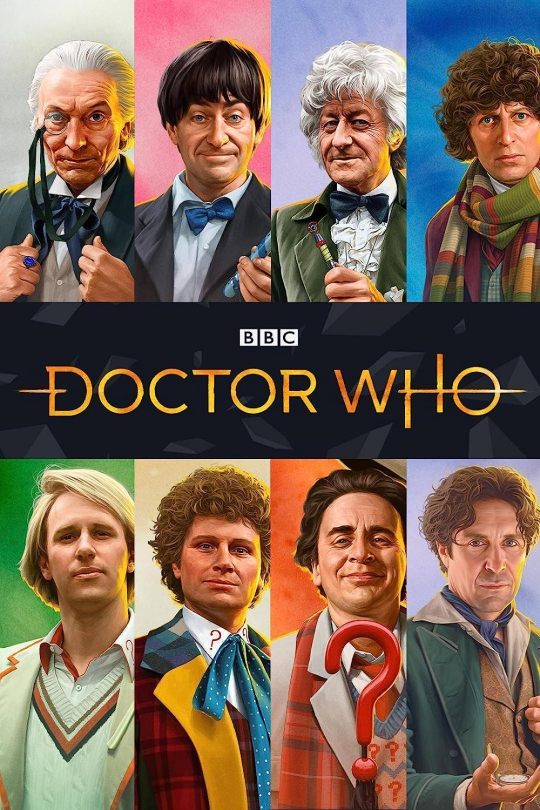#doctor who (1963-1989)
Text
Doctor Who Television Entries Mega Re-Watch Thoughts...
It has been a couple of weeks or so since I completed this and I realised I didn't get around to adding my thoughts so here we go...
Rules: Every available episode of Doctor Who from 1963 to the present MUST be watched, including episodes where animation or archive footage has been used to fill the gaps. Of course missing episodes are by definition missing and had to be skipped.
(NO I did not include Dimensions in Time, I already have enough enduring childhood trauma from watching that the first time, thanks.)
How long did it take: We started in mid November and re-watched the 2023 Christmas Special on 28th February this year.
Favourite Doctors: Two, Three, Twelve, Fourteen (I am not saying Four because it's too obvious that Four is considered one of the highlights of the entire show, but personally he's never been my favourite though I do appreciate him!)
Doctors Unexpectedly Enjoyed: Six, everyone tells you his era is bad and yes...it's not great, but going back into his era with this frame of mind meant I had low expectations and it was actually fun?
Doctors Unexpectedly NOT Enjoyed: I love David Tennant and am a huge fan but going back to his era with my fangirl goggles having aged 15ish years I have to say Ten is not as great as I remember. In fact I loved Fourteen so much because he felt like what Ten should be? I also found Eleven pretty difficult to revisit and I was shocked about it.
Doctors Who Get to Skip my Judgment: Eight (because I haven't really got into Big Finish yet) and Fifteen (not seen enough of him yet, but he seems fun.)
Favourite Companions (Unsurprising): Jamie, Sarah Jane, Ace, Donna, Bill
Favourite Companions (Surprising): Tegan (as a wee girl I found her loud/annoying), Peri (see previous comment about Six, also she did suffer from "for the dads" a bit), Clara (I admit the first time I watched her episodes, I fell into the "she's a Mary Sue" way of thinking), Graham (Thirteen's era is generally treated harshly hence including him)
Companions unexpectedly NOT enjoyed: I feel a bit harsh for this but...Amy and Rory. I love Eleven's era overall but I can't explain it, I feel how I feel.
Favorite TARDIS Teams: SO many but special mentions to Two, Jamie, Zoe & Four, Sarah Jane, Harry & Nine, Rose, Jack & Ten, Donna & Twelve, Bill, Missy, Nardrole.
Favourite Master: Tied between the OG Delgado and Michelle Gomez.
Favourite Other (Regular) Enemy: This is a difficult one because all of the regular enemies have great episodes, good episodes, ok episodes and absolute stinkers. But other than The Master I have to say there's a reason the Daleks endure, a lot of The Doctor's other enemies just seem like they're picking parts from Dalek lore and trying to twist it into their own. That said, until too much was revealed about them the Weeping Angels in the Modern era were a great concept.
A Serial/Episode I'd recommend: From Classic Who there's so many but a personal favourite is Horror of Fang Rock (it's very self-contained and you don't need to know much about Doctor Who, great 70s era horror serial) and I'm going to be a Modern Who Cliche and recommend Heaven Sent (you might be confused on the lore or what's going on, but Capaldi's performance is phenomenal.)
Thoughts on the TV Movie: Paul McGann deserved better!
Would I recommend doing this: ONLY if you are already familiar with Doctor Who and like Doctor Who a lot. The Classic Series can be quite difficult to vibe with if you are not used to the different pacing, the low-budget aesthetic and the different demands from the actors/characters. Emotional moments tend to flicker out quickly.
Also the missing episodes in One and Two's era are a challenge. I think a whole re-watch for the Modern Era is better if that's what you're familiar with...but if you want to tackle Classic Who either start with Three (it's a great entry point) and watch recommended serials from One and Two OR you can just pick one recommended serial per Doctor and see if you like that particular incarnation.
You need to keep in mind that it's something ridiculous like nearly 800 episodes of content, you're going to potentially be doing this a loooooong time. We burned through it so quickly because we'd watch a few episodes in the evenings and weekend mornings.
#doctor who#classic who#modern who#doctor who (1963-1989)#doctor who 2005#rewatch#my thoughts#the doctor
1 note
·
View note
Text
There have been 82 Doctors at this point!
Keep reading line because the list is so damn long.
Main Continuum
(In order of appearance)
Classic Who
First Doctor (William Hartnell 1963 – 1966, Richard Hurdnall 1983, David Bradley 2017, 2022)
Second Doctor (Patrick Troughton 1966 – 1969)
Third Doctor (John Pertwee 1970 – 1974)
Fourth Doctor (Tom Baker 1974 – 1981)
Fifth Doctor (Peter Davidson 1981 – 1984)
Sixth Doctor (Colin Baker 1984 – 1986)
Seventh Doctor (Sylvester McCoy 1987 – 1989)
Eighth Doctor (Paul McGann 1996 movie)
Nu Who
Ninth Doctor (Christopher Eccleston 2005)
Tenth Doctor (David Tennant 2005 – 2010)
Eleventh Doctor (Matt Smith 2010 – 2013)
The War Doctor (John Hurt 2013)
Twelfth Doctor (Peter Capaldi 2013 – 2017)
Thirteenth Doctor (Jodie Whittaker 2017 – 2022)
Fourteenth Doctor (David Tennant 2023)
Fifteenth Doctor (Ncutu Gatwa 2023 - ?)
Pre - Memory Doctors
(Timeless child my beloathed)
Morbius Doctors (Robert Holmes, Graeme Harper, Douglas Camfield, Philip Hinchcliffe, Christopher Baker, Robert Banks Stewart, George Gallaccio and Christopher Barry 1976)
The Other (Sylvester McCoy, 1990)
The Fugitive Doctor (Jo Martin 2020)
The Timeless Child(ren) (TBA, Grace Nettle, Leo Tang, Jac Jones, TBA, Jesse Deyi 2020)
Brendan (Evan McCabe 2020)
Possible Future Doctors
(italicized parts of names are the title of that Doctor's first appearance, if I can't find a better name)
Father of Time (No Actor, 1987)
"Merlin" or The Battlefield Doctor (No actor, 1991)
The Army of Shadows Doctor (No actor, 1991)
"Fred" (No actor, 1993)
The Relic (no actor 1997, 2002)
The Storytelling Doctor (Tom Baker 1999)
The Web of Caves Future Doctor (Mark Gatiss, 1999)
The Blue Angel Future Doctor (No Actor, 1999)
The Curator 1 (Tom Baker, 2013)
The Curator 2 (Collin Baker, 2022)
Pseudo-Doctors
The Watcher (Adrian Gibbs 1981)
The Valyard (Michael Jayston 1986)
The Obverse Eight Doctor (No actor, 1999)
The Metacrisis Doctor (David Tennant 2008)
The DoctorDonna (Catherine Tait 2008)
The Dream Lord (Tony Jones 2010)
The Ganger Doctor (Matt Smith 2011)
The Spriggan (David Tennant 2022)
Alternate Realities
Dalek Films
Dr. Who (Peter Cushing 1965, 1966)
The Inferno Universe
The Leader (Jack Kine, 1970)
Doctor Who and the Daleks in Seven Keys to Doomsday
The Doctor (Trevor Martin 1974)
Previous Doctor (Nocholas Briggs 2008)
The Lenny Henry Show
The Seventh Doctor (Lenny Henry 1986)
What If?
The Eighth Doctor (No actor, 1997)
The Infinity Doctors
The Infinity Doctor (No actor, 1998)
The Curse of Fatal Death
The Doctor (Rowan Atkinsen 1999)
The Quite Handsom Doctor (Richard E Grant 1999)
The Shy Doctor (Jim Briadbent 1999)
The Handsom Doctor (Hugh Grant 1999)
The Female Doctor (Joanna Lumley 1999)
The Chronicles of Doctor Who?
The Doctor (no actor, 2000)
Klein's Story
Johann Schmidt (Paul McGann, 2010)
Father Time
The Emperor (No actor, 2001)
Scream of the Shalka
The 9th Doctor (Richard E Grant 2003)
Doctor Who Unbound
The Doctor (Geoffrey Bayldon 2003)
The Unbound Doctor (David Warner 2003)
The Heartless Doctor (David Collings 2003)
The New Heartless Doctor (Ian Brooker 2003)
Martin Bannister (Derek Jacobi 2003)
The Victorious Valyard (Michael Jayston 2003)
The Previous Doctor (Nicholas Briggs 2003)
The Exile Doctor (Arabella Weir 2003)
The Warrior (Collin Baker 2022)
Gallifrey - Disassembled
Lord Burner (Collin Baker 2011)
Gallifrey - Regenerators
Commentater Theta Sigma (Collin Baker, 2011)
False Negative
The Doctor (No actor, 2017)
The People Made of Smoke
The Sixth Doctor (Dan Starkey, 2020)
Unspecified Doctors
Yeah sometimes they just say "The Doctor" and don't bother specifying...
The Cabinet of Light Doctor (No Actor, 2003)
The Dalek Factor Doctor (No actor, 2004)
658 notes
·
View notes
Note
how would you recommend watching doctor who? there are so many different guys idk how it works.
so the thing about doctor who is that there's two shows -- classic who (1963-1989, doctors 1-7) and new who (2005-2023, doctors 9-14). due to a renumber of the seasons and a change in production company, i think it's fair to call the upcoming version of who (2023-??, doctors 15-??) its own, third show. the reason it's been able to run for so long is that when the show's lead actor, (william hartnell as the titular doctor) had to step down in 1966 due to failing health, they made up some sci-fi bullshit: the doctor's species can 'regenerate' instead of dying, instantly healing but changing their appearance and some of their personality. this means that every time a lead actor has walked away (or, in one unfortuante case, been fired) the show's just recast the doctor and moved on, often with notable changes in tone and format.
the easiest option if you don't want to backwatch anything is to start with this year's christmas special, the church on ruby road (2023). it's an obvious jumping on point to the series, introduces you to all the basic stuff (the doctor, the TARDIS, the fact that it's a silly sci-fi show about fighting weird rubber prop critters), and presumably sets up the upcoming season 1 of the disney-bad wolf version of the show that's gonna come out in may 2024.
if you do want to backwatch, you have to decide if you want to start with new who or classic who. i personally would recommend starting with new who, because there's less of it, it's got higher production values, and (imo this is the biggest obstacle to getting into classic who) it's paced in a way that makes much more sense to a modern TV viewer (self-contained 45-minute episodes). also once you're invested in the show, its main character, and some of its classic elements, you get to soyjak at the screen whenever you're watching classic who and you get to see the oirign of a monster you already recognize. you can also skip classic who entirely and never watch it, they don't bring up anything from it in the new series without giving it a new explanation, but if you do this you hate fun.
anyway, starting points for nuwho: the most obvious one is rose (2005). it's the pilot episode for the new show and imo it holds up brilliantly -- it introduces all the most basic concepts of the show, but ultimately it's really all about billie piper and cristopher eccleston's performances and they deliver. the special effects are gonna be pretty terrible for a while because it's early 2000s cg. there's no jumping on point like it for the whole of RTD's run of the show (imo, the best run of nuwho) so if you want to watch seasons 1-4 you've gotta start on rose.
another episode that's written as a jumping on-point is (heavy sigh) the eleventh hour (2011). as well as introducing matt smith's doctor and his companion amy, this also does the whole rigamarole of introducing the show's core elements, giving a nutshell recap of its history in the form of the doctor's rooftop speech, and also signal what the oncoming moffat era is going to be like (whimsical, full of complex time travel plots, way more misogynist). i'm biased -- i'm a hater, one of this episode's central plot conceits sucks real bad and i also hate the eleventh doctor's whole run. but it is meant to be a jumping on point.
there won't be another one of those in nuwho until the pilot (2017). this begins moffat's final season with which he made the odd but extremely welcome decision to jettison all his convoluted continuity shit from the last five seasons and refocus the show with the doctor being a professor at bristol university with a mysterious secret. i think season 10 is a hidden gem and if you find starting from rose daunting this is the next best place to pick up. capaldi's doctor is a delightful abrasive eccentric with a heart of gold at this point in his run & the stories are wall-to-wall bangers with only a couple misses.
finally, you could start on the woman who fell to earth (2018), the first episode to feature jodie whittaker's 13th doctor and head writer chris chibnall. i'd recommend this even less than the eleventh hour, because while i actually like it more, i think it's a much worse preview of what the upcoming era is going to be like than that one. if you watch the woman who fell to earth and keep watching from the start of whittaker's run on the show off the back of it, you're going to be severely disappointed as most of the more promising aspects of the episode get instantly abandoned.
so, summary, if you're starting with nuwho, there's five jumping on points, which i'd rank:
rose > the pilot > the church on ruby road > the eleventh hour > the woman who fell to earth
but i want to start with classic who because i'm a contrarian
alright. classic who also has a few jumping off points -- before i mentioned them, let me just talk about that format thing i mentioned earlier. classic who doesn't have self-contained episodes for the most part, but rather for most of its run told each of its episodic narratives across between two and seven 20-minute episodes. this leads to a lot of weird pacing, forced cliffhangers, and infamously a lot of filler shots of the doctor running up and down identical corridors. so obvsies i'm recommending entire stories here nad not individual episodes. that said, let's look at where you could jump on:
an unearthly child (1963). this is, like, the start of the show. that said i don't recommend it as a place to start (funnily enough), for a couple reasons. firstly, because of dreadful fucking archiving by the BBC, a lot of episodes from the show's first six seasons are straight up missing. some of them have been animated by the BBC from surviving audio recordings, but some of them are just straight up lost -- due to the format, this means there's very few full complete stories, which makes this whole era really hard to navigate. if you don't mind that and really want to start in the black and white era, i'd still recommend the tomb of the cybermen (1967) instead -- hartnell's portrayal of the doctor as a haughty, slightly impish old professor is great, but troughton basically defined the character's core traits for the next sixty years.
spearhead from space (1970) is a pretty big format upheaval for the show and so serves as a pretty great classic jumping-on point. it's the first episode to be in colour, and sets up a new status quo for the doctor as being trapped on earth and working for an elite paramlitary organization called UNIT that operates out of a ratty office. it's an interesting premise that the show gets some great stories out of. the special effects are bad in the best way. pertwee has instant charm in the role and it's all around a banger by classic standards.
if you want to jump right to the one all the boomers are nostalgic for, you can also start with robot (1974). i wouldn't recommend it, though--tom baker is electric in the role from the start, but the episode itself kind of assumes a lot of the context of the third doctor's setup and supporting cast which you're not gonna have.
i wouldn't recommend anyone start at any point during the fifth or sixth doctors runs because i want them to actually like the show, so i guess the last jumping on point i could really recommend after robot would be, like, dragonfire (1987), which heralds the show's short-lived renaissance with the seventh doctor and his best companion, ace. but although you'd be watching some of the absolute best the classic show ever gets, it feels like it would be a weird and disorienting place to start.
finally, you could watch tales of the tardis (2023), a limited series produced to celebrate the show's 60th anniversary. each episode follows the same format: through a vaguely handwaved Palace of Memories plot, two much-aged characters from the classic series meet up and fondly remember one of the adventures they shared. the bookends with the original actors are mostly shameless fanservice, but the episodes they're reminiscing about are superbly edited down into a much more watchable format -- it works as a good 'sample platter' for most eras of the show (although, weirdly, there wasn't anything from tom baker's run!) and i think it honestly wouldn't be a bad shout to just start from tales of the tardis and then keep watching from whichever of the stories featured in it you liked most. that all said, if you want to start with classic who, i'd rank these jumping on points as follows:
spearhead from space > tales of the tardis > tomb of the cybermen > dragonfire > robot > an unearthly child
all that shit said it's fundamentally a very episodic show with very few exceptions like trial of a time lord and whatever moffat was doing seasons 6-7 so in the end you can basically just start with any episode and more or less get some of the idea. have fun and make sure to do the most important job of a doctor who fan, update the tardis wiki page for penis whenever one is mentioned
658 notes
·
View notes
Text
I've never seen a more prophetic trading card:


The New Adventures
Are the New Adventures novels "real" in the context of the show? Generally, only the primary medium and author of a work are considered canonical; for example, only printed stories by Arthur Conan Doyle form the Sherlock Holmes "canon." But in the years since the Seventh Doctor's final stories aired in 1989, there has been no new Who in its primary medium of television, and nine of the New Adventures published to date are by the same writers as the tv adventures. Some fans believe that only the 1963-1989 tv series should be considered canon, while others believe that the New Adventures and Missing Adventures novels should be provisionally accepted as "real"—at least until the Doctor returns to tv (we hope!). Only in printed media do we find such latter-day companions as Bernice Summerfield et al to read about and enjoy. Whether she's real or not, one thing is certain: the Doctor's adventures continue, somehow, somewhere.
#doctor who#classic doctor who#7th doctor#seventh doctor#bernice summerfield#virgin new adventures#VNAs
48 notes
·
View notes
Text
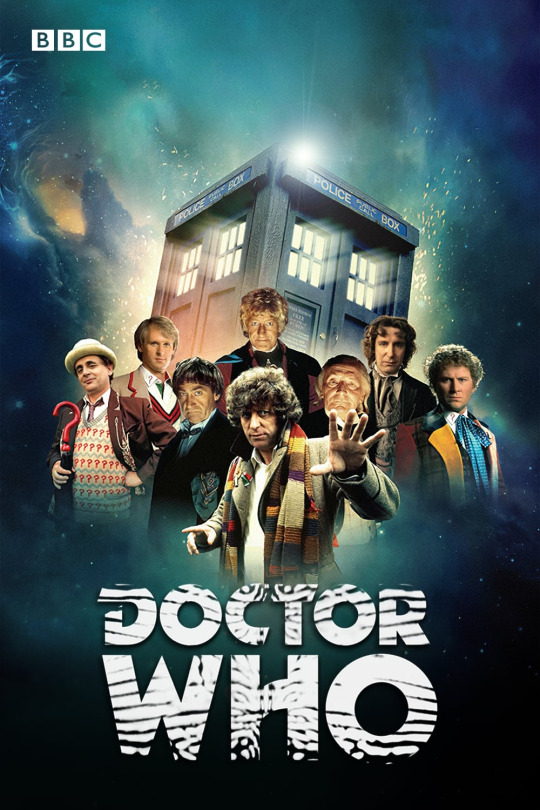
#tv shows#tv series#polls#doctor who 1963#doctor who#william hartnell#tom baker#jon pertwee#1960s series#british series#have you seen this series poll
92 notes
·
View notes
Text
For screenreaders, this is a poll
The question is "What form of Media introduced you to Doctor Who?"
Option one is "The show - Classic Who (1963-1989)"
Option two is "The show - New Who (2005-Present Day)"
Option three is "Doctor Who The Movie (1996)"
Option four is "The comics"
Option five is "The magazines"
Option six is "The audios"
and Option seven is "The Novels"
#dw#doctor who#big finish#eighth doctor#classic who#new who#the tenth doctor#doctor who the movie#doctor who the movie 1996
55 notes
·
View notes
Text
Actually here's a doctor who poll I don't think we've had yet!
ETA: point of clarification!! I said 'regeneration' not 'incarnation' for a reason; Ainley & Crispy are undoubtedly different versions of the character, the point of contention is whether or not possessing Tremas's body constituted a regeneration.
If you think there's more than one but less than four feel free to explain in the tags how you divvy them up! & if you think there's more than four please explain your reasoning.
107 notes
·
View notes
Text
Doctor Who (1963–1989; 2005–):

[Text: The Doctor "has no clue"]
363 notes
·
View notes
Photo


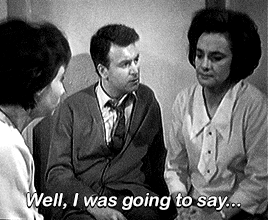
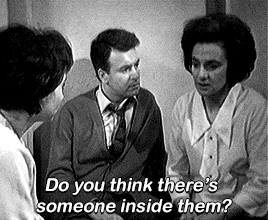
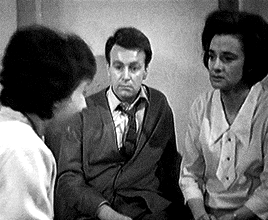
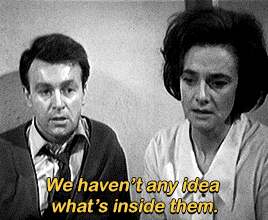
1.06 — The Survivors (The Daleks)
DOCTOR WHO (1963-1989)
#doctor who#classic who#the daleks#susan foreman#barbara wright#ian chesterton#classicwhoedit#dwedit#timelordgifs#1v1#gifs#firstdoctoredit#mine#first doctor era#my first time gifing a random scene#i hope it's not too sharp?#the revelation that the daleks are organic creatures is one of the coolest reveals ever
265 notes
·
View notes
Text
Ok fine I'm gonna watch Doctor who (1963-1989).....
36 notes
·
View notes
Text
You're already a fan of the ancient astronaut theory.
Here's a list of books, movies, TV shows, and video games featuring ancient astronauts. (revised)
▪︎Edison's Conquest of Mars (1898)
▪︎The Call of Cthulhu (1926)
▪︎Analog Science Fiction and Fact (1930)
▪︎At the Mountains of Madness (1931)
▪︎Childhood's End (1953)
▪︎Forbidden Planet (1956)
▪︎Quartermass and the Pit (1958)
▪︎The Twilight Zone (1959)
▪︎The Sirens of Titan (1959)
▪︎The Flintstones (1960)
▪︎Doctor Who (1963)
▪︎Hercules Against the Moon Men (1964)
▪︎Known Space (1964)
▪︎Star Trek (1966)
▪︎2001: A Space Odyssey (1968)
▪︎Chariots of the Gods (1968)
▪︎The Bible & Flying Saucers (1968)
▪︎Horror Express (1972)
▪︎Rendezvous with Rama (1973)
▪︎Land of the Lost (1974)
▪︎The Spaceships of Ezekiel (1974)
▪︎The Outer Space Connection (1975)
▪︎Space: 1999 (1975)
▪︎The Sirius Mystery (1976)
▪︎The Earth Chronicles (1976)
▪︎Star Wars (1977)
▪︎Close Encounters of the Third Kind (1977)
▪︎The Manna Machine (1978)
▪︎Invasion of the Body Snatchers (1978)
▪︎Battlestar Galactica (1978)
▪︎Hitchhiker's Guide to the Galaxy (1978)
▪︎Monty Python's Life of Brian (1979)
▪︎Alien (1979)
▪︎Hangar 18 (1980)
▪︎Valis (1981)
▪︎The Thing (1982)
▪︎Xevious (1982)
▪︎Super Dimension Fortress Macross (1982)
▪︎The Transformers (1984)
▪︎Cocoon (1985)
▪︎Bio Booster Armor Guyver (1985)
▪︎The Legend of Zelda (1986)
▪︎Predator (1987)
▪︎Killer Klowns from Outer Space (1988)
▪︎Red Dwarf (1988)
▪︎The Gods of Eden (1989)
▪︎Moontrap (1989)
▪︎Spriggan (1989)
▪︎Total Recall (1990)
▪︎Babylon 5 (1993)
▪︎The X-Files (1993)
▪︎Stargate (1994)
▪︎Neon Genesis Evangelion (1994)
▪︎Fingerprints of the Gods (1995)
▪︎Encounter with Tiber (1996)
▪︎Final Fantasy (1997)
▪︎Earth: Final Conflict (1997)
▪︎The Fifth Element (1997)
▪︎Space Island One (1998)
▪︎Naked Pictures of Famous People (1998)
▪︎Dilbert (1999)
▪︎Futurama (1999)
▪︎Star Ancestors (2000)
▪︎Mission to Mars (2000)
▪︎Halo (2001)
▪︎Ice Age (2002)
▪︎Alien vs. Predator (2004)
▪︎The Orion Zone (2007)
▪︎Mass Effect (2007)
▪︎Assassin's Creed (2007)
▪︎Outlander (2008)
▪︎Indiana Jones and the Kingdom of the Crystal Skull (2008)
▪︎Marvel Cinematic Universe (2008)
▪︎Spore (2008)
▪︎Knowing (2009)
▪︎The Fourth Kind (2009)
▪︎Ancient Aliens (2009)
▪︎Borderlands (2009)
▪︎The Great Airship of 1897 (2010)
▪︎Dark Void (2010)
▪︎The Ancient Alien Question (2011)
▪︎Cowboys and Aliens (2011)
▪︎Battle: Los Angeles (2011)
▪︎Paul (2011)
▪︎John Carter (2012)
▪︎Prometheus (2012)
▪︎Iron Sky (2012)
▪︎Man of Steel (2013)
▪︎Beyond the Sky (2018)
▪︎Resident Alien (2021)
▪︎Moonfall (2022)
▪︎Prey (2022)
▪︎65 (2023)
7 notes
·
View notes
Text
All Doctor Who Title Sequences: 1963-2023 | Doctor Who
youtube
Butterfly wings (1963-1967)
Howlround (1967-1969)
Suspiria (1970-1973)
Diamonds I: Vortex (1973-1974)
Diamonds II: TARDIS (1974-1980)
Starfield: Original/Fade In (1980-1981)
Starfield: Original/Slide In (1981-1984)
Starfield: Brighter/Flash In (1984-1985)
Starfield: Brighter/Flash In/Remix (1986)
Sylver & Ice (1987-1989)
"The TV Movie" (1996)
Past & Future: Orchestral/Plain Logo (2005-2006)
Past & Future: Orchestral/Firey Logo (2006-2007)
Past & Future: Rock Mix/Firey Logo (2007-2010)
Lightning storm: TARDIS Logo (2010-2011)
Lightning storm: Themed Logos (2012)
Swirl! Whoosh! Zaap! Zip! (2012-2013)
Time is spiralling (2014-2017)
Gloopy (2018-2022)
Diamonds III: Clouds (2023- )
#doctor who#william hartnell#patrick troughton#jon pertwee#tom baker#peter davison#colin baker#sylvester mccoy#paul mcgann#Christopher Eccleston#david tennant#matt smith#peter Capaldi#jodie whittaker#ncuti gatwa#dw opening titles#dw Season 1#dw season 4#dw season 7#dw season 11#dw season 12#dw season 18#dw season 19#dw season 21#dw season 23#dw season 24#doctor who (1996)#dw series 1#dw 2005 specials#dw series 4 specials
8 notes
·
View notes
Text
'In its most recent episode, Doctor Who broke one of its oldest and most fundamental rules. On the one hand, it can be exciting when a long-running pop culture property breaks a rule it has set for itself; it means something interesting is about to happen. On the other hand, sometimes breaking a rule is boring and self-indulgent. I’m afraid that in Doctor Who’s case, we’re following the second scenario...
Here’s the trick that made Doctor Who run for 60 years since its first premiere in 1963 (plus or minus a decades-long hiatus and an ill-advised TV movie): The Doctor always changes.
Doctor Who is an institution of science fiction, but it has a deceptively simple premise. The titular Doctor is a member of an alien race known as the Time Lords. He has a time machine/spaceship called the Tardis. He likes to pick up a friend periodically — usually a human from the late 20th or early 21st century, frequently a young woman — and travel with them through time and space, having adventures.
Sometimes the Doctor and his companion go back in time and meet Sir Isaac Newton. Sometimes they go to the edge of the universe and explore a haunted spaceship. They can go anywhere, to any time or any place. And, crucially, the Doctor can be anyone.
Every time the Doctor dies, he regenerates into a new body, played by a new actor. The way he expresses his personality shifts: he goes from crotchety to fun-loving to aggressive to cold. He picks up a new signature outfit, a new signature catchphrase. He loses old companions and gains new ones. He redecorates the Tardis.
Yet the Doctor remains the same character with the same history. He always changes; he is always the same. This paradox is the heart of the show, and it’s why Doctor Who has managed not just to last so long but to also turn out good episodes on a fairly regular basis.
The premise of regeneration is flexible. It is practical. It can withstand cast shifts and actor disputes. It prevents stasis and staleness. Most importantly, it speaks to the truth of how identities work: Our personalities are not set; they flux and change and distort themselves in bizarre ways we can never fully understand. We change, we grow, we lose who we used to be.
All of which is why the Doctor’s most recent regeneration, which aired December 9, is so frustrating. Doctor Who broke its own rules. For the first time, the Doctor kept his past self.
The newest episode was the third and final of a mini-season’s worth of specials airing between seasons 14 and 15. The specials were highly anticipated, in part because they were all written by Russell T. Davies, who first resurrected Doctor Who from the dead in 2005 and departed in 2010. (The original run of the show aired on the BBC from 1963 to 1989.) The specials also starred David Tennant, whose iconic turn as the Tenth Doctor made a new generation of fans fall in love with Doctor Who. The whole thing was a fairly straightforward plea for old fans to come back after a few seasons of falling ratings.
Tennant’s return to the role was teased in October 2022 when Jodie Whittaker’s Thirteenth Doctor died. (Whittaker was the first woman to take on the role.) Officially, the Thirteenth Doctor was supposed to regenerate into a Fourteenth Doctor played by Ncuti Gatwa, the first Black actor to play the Doctor. Instead, in a surprise twist, Whittaker transformed into Tennant, now taking on the role of the Fourteenth Doctor.
“If you thought the appearance of David Tennant was a shock, we’ve got plenty more surprises on the way! The path to Ncuti’s Fifteenth Doctor is laden with mystery, horror, robots, puppets, danger and fun!” teased Davies in a statement shortly after the episode aired. “We’re giving you a year to speculate, and then all hell lets loose!”
The official plan was that Tennant would play the Fourteenth Doctor through the three 2023 specials and that, at the end, Tennant’s Fourteenth Doctor would transform into Gatwa’s Fifteenth Doctor. In the most recent episode, “The Giggle,” that’s not quite what happens.
Instead, when the Doctor regenerates, he splits into two people. One is played by Tennant. The other is played by Gatwa. Both, they assure everyone at once, are equally the Doctor. Fourteen and Fifteen are both alive together, at once.
Each of them even gets their own Tardis, the Doctor’s trademark spaceship/time machine. The pair agree that Gatwa’s Doctor will go off and have adventures, which presumably the show will go on to follow. Tennant’s Doctor, meanwhile, will rest with his old companion Donna Noble and heal from his PTSD — and, presumably, remain available for guest appearances whenever ratings are in danger of flagging.
“David [Tennant] is parked,” Davies explained in the companion show Doctor Who Unleashed. “For once, we’ve got a happy Doctor who is no longer saving the universe, but is parked with Donna (Catherine Tate) for a happy life, while the Doctor — which is always the next Doctor, and that’s always true of Doctor Who, the Doctor is the next Doctor — is out amongst the stars.”
The transition is a remarkable echo of the last time David Tennant’s Tenth Doctor regenerated, back in 2010. Back then, Tennant had a handy clone available who went off to live with his old companion Rose Tyler in an alternate universe, while the central Tenth Doctor reluctantly died and transformed into Matt Smith’s Eleventh Doctor. This time, the Fourteenth Doctor doesn’t have to die, or even so much as move to a different dimension. He simply retires to the suburbs.
This persistent desire to hang on to Tennant shows Doctor Who (and particularly Davies’s Doctor Who) talking out of both sides of its mouth. It’s as if the show is saying, “Yes, yes, on the one hand the Doctor always changes, but on the other hand he is also always David Tennant and he is also always living somewhere safely with your favorite companion, unless you are a Martha fan lmao.” Tennant gets treated as though he is somehow more the Doctor than any other incarnation.
On the official Doctor Who podcast, Davies teased the idea that the bigeneration of Fourteen and Fifteen may have caused the whole timeline to bigenerate, so that each past Doctor now is alive in a splinter timeline. “I think all of the Doctors came back to life with their individual Tardises … and they’re all out there traveling round in what I’m calling a Doctor verse,” Davies explained.
The attempt at a Marvel-style endlessly overlapping universe line is self-indulgent and sentimental in all the wrong ways. It is a betrayal of what makes regeneration such a durable and dramatically rich premise, which is that the Doctor can never fully regain his past self — and neither can the audience. Even if you are a Time Lord, the past is a foreign country, and your oRwn personal past especially so. We can never fully go back — until the BBC decides it’s time it got its own MCU. In that case, we go back again and again.'
#Doctor Who#60th Anniversary#Russell T. Davies#The Giggle#Bi-generation#Jodie Whittaker#David Tennant#Sir Issac Newton#Ncuti Gatwa#Catherine Tate#Donna Noble#Doctor Who: Unleashed#Rose Tyler#Billie Piper#Matt Smith
10 notes
·
View notes
